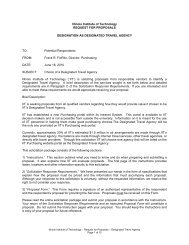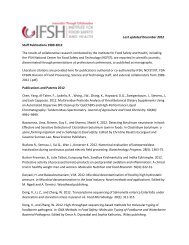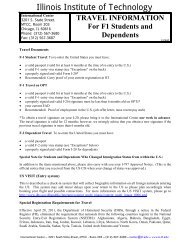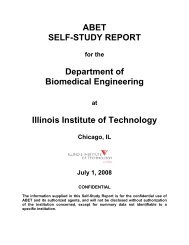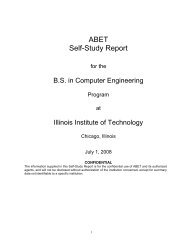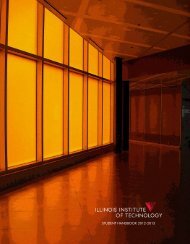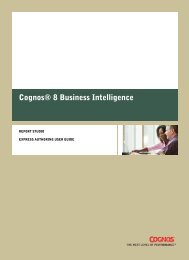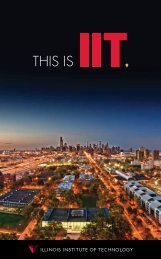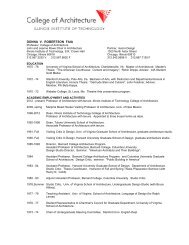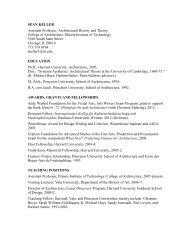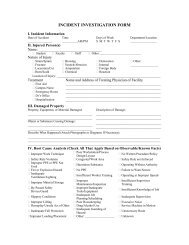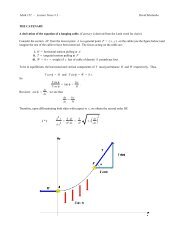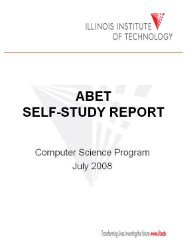Copyright & Disclaimer Information - Illinois Institute of Technology
Copyright & Disclaimer Information - Illinois Institute of Technology
Copyright & Disclaimer Information - Illinois Institute of Technology
Create successful ePaper yourself
Turn your PDF publications into a flip-book with our unique Google optimized e-Paper software.
<strong>Illinois</strong> <strong>Institute</strong> <strong>of</strong> <strong>Technology</strong><br />
Chemical Engineering<br />
Chemical engineering is concerned with the design, development<br />
and management <strong>of</strong> facilities that convert raw materials<br />
into useful products. The engineer must assume responsibility<br />
for the economical use <strong>of</strong> the raw materials, preservation<br />
<strong>of</strong> the environment, and pr<strong>of</strong>itability <strong>of</strong> the operation. The<br />
Coursework<br />
The chemical engineering curriculum emphasizes basic<br />
knowledge and applications <strong>of</strong> transport processes, thermodynamics<br />
and kinetics <strong>of</strong> processes, automatic control, and<br />
design, as well as fundamental sciences, mathematics and<br />
engineering sciences. Design experience is spread across the<br />
curriculum, beginning with the Introduction to the<br />
Pr<strong>of</strong>ession courses, and is integrated in environmental,<br />
economic and societal issues. Equipment design is emphasized<br />
in courses such as Fluid Mechanics and Heat-Transfer<br />
Operations, Mass-Transfer Operations, and Chemical<br />
Reaction Engineering. Control-system design is practiced in<br />
Pr<strong>of</strong>essional Training<br />
Pr<strong>of</strong>essional training is stressed equally in the design <strong>of</strong> the<br />
chemical engineering curriculum. Because engineering is<br />
largely a team effort, the department develops the individual’s<br />
ability to work effectively as a team member. Group projects<br />
are assigned starting with the Introduction to the Pr<strong>of</strong>ession<br />
course. Laboratory course and capstone design course projects<br />
are conducted by teams <strong>of</strong> students. The laboratory<br />
work is designed to reinforce the concepts developed in the<br />
lectures and to show the application <strong>of</strong> chemical engineering<br />
Specialized Programs<br />
In addition to the core curriculum, special programs exist to<br />
accommodate the student who wants to develop more extensive<br />
background in related areas. With their exposure to a<br />
wide range <strong>of</strong> industrial applications and problems, students<br />
are better equipped to make a decision to explore an area <strong>of</strong><br />
interest in depth. Pr<strong>of</strong>essional specializations are available in:<br />
� Energy/Environment/Economics (E 3 );<br />
� Environmental Engineering;<br />
� Polymer Science and Engineering;<br />
� Bioengineering; and<br />
� Process Design and Operation.<br />
These programs are described on the following pages.<br />
<strong>Copyright</strong> & <strong>Disclaimer</strong> <strong>Information</strong>: <strong>Copyright</strong> © 1994, 1995, 1996, 1997, 1998, 1999, 2000, 2001, 2002, 2003, 2004, 2005, 2006, 2007. CollegeSource®, Inc. and Career Guidance Foundation. CollegeSource® digital catalogs are derivative works owned and copyrighted by CollegeSource®, Inc. and Career Guidance Foundation. Catalog content is owned and copyrighted by the appropriate school. While CollegeSource®, Inc. and Career Guidance Foundation provides information as a service to the public, copyright is retained on all digital catalogs.<br />
<strong>Copyright</strong> & <strong>Disclaimer</strong> <strong>Information</strong>: <strong>Copyright</strong> © 1994, 1995, 1996, 1997, 1998, 1999, 2000, 2001, 2002, 2003, 2004, 2005, 2006, 2007. CollegeSource®, Inc. and Career Guidance Foundation. CollegeSource® digital catalogs are derivative works owned and copyrighted by CollegeSource®, Inc. and Career Guidance Foundation. Catalog content is owned and copyrighted by the appropriate school. While CollegeSource®, Inc. and Career Guidance Foundation provides information as a service to the public, copyright is retained on all digital catalogs.<br />
Chemical and Environmental Engineering<br />
chemical engineering program has been designed to provide<br />
both the engineering competence and the pr<strong>of</strong>essional skills<br />
necessary to succeed in this endeavor. In order to achieve this<br />
objective, the curriculum incorporates coursework in both <strong>of</strong><br />
these areas throughout the four-year duration <strong>of</strong> the program.<br />
the Process Control course. Process modeling, simulations<br />
and optimization are discussed and practiced in Transport<br />
Phenomena, Process Modeling and System Theory,<br />
Numerical and Data Analysis, Statistical Tools for<br />
Engineering, and Process Control courses. The capstone design<br />
courses (Chemical Process Design and Process Design IPRO)<br />
integrate these design concepts and practice process design<br />
and optimization. In addition to engineering competence,<br />
the program also examines the economic, environmental and<br />
societal implications <strong>of</strong> chemical engineering.<br />
principles to the solution <strong>of</strong> real-world problems. Because<br />
individual attention is so important to the student’s growth,<br />
laboratory sections are small and a high level <strong>of</strong> personal contact<br />
between student and instructor is maintained. Students<br />
are encouraged to become involved with state-<strong>of</strong>-the-art<br />
research projects at the undergraduate level. The industry/university<br />
co-op program is available to students who would like<br />
to use one or more extra semesters any time after their<br />
sophomore year to work on an internship in industry.<br />
Students may also choose the following minors (see page 104):<br />
� Air Force Aerospace Studies;<br />
� Applied Mathematics;<br />
� Fire Protection and Safety Engineering;<br />
� Management;<br />
� Military Science; and<br />
� Naval Science.<br />
All students must include in their minor program, or as<br />
a technical elective, CHE 426 (Statistical Tools for Engineers)<br />
or at least one three-credit-hour engineering science course.<br />
Students who plan to go to graduate school are advised<br />
to take CHE 535 (Applications <strong>of</strong> Mathematics to Chemical<br />
Engineering) as a technical elective.<br />
IIT Undergraduate Bulletin 1999-2001 51



